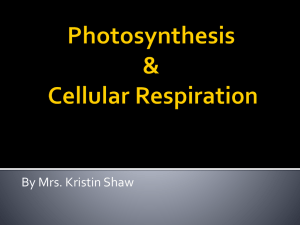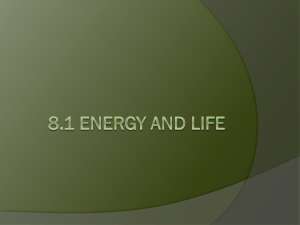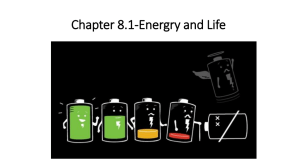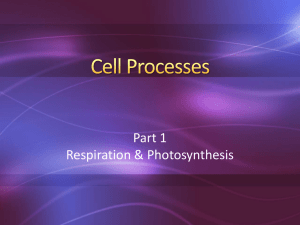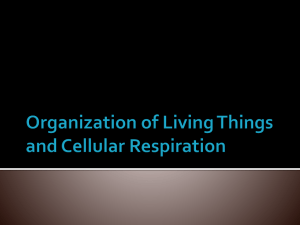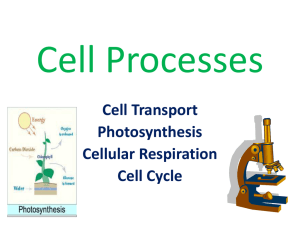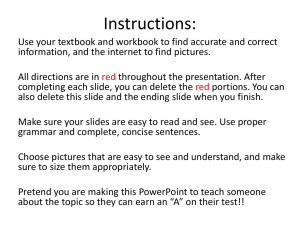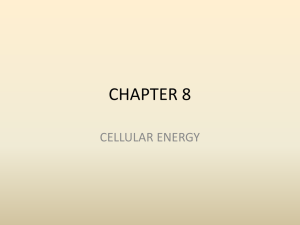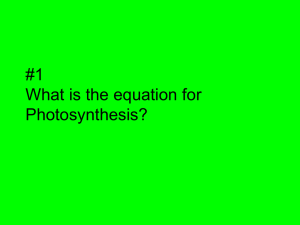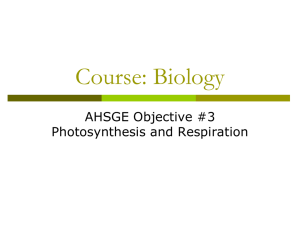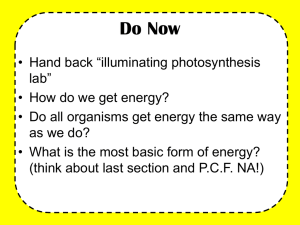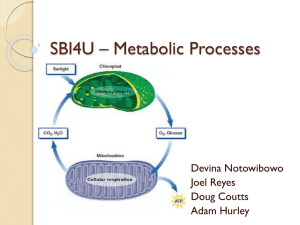Bell Ringer (5 mins)
advertisement
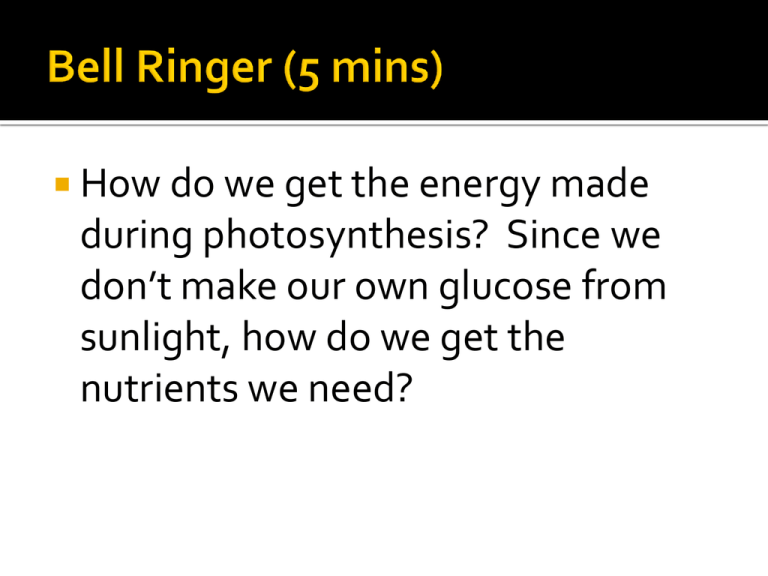
How do we get the energy made during photosynthesis? Since we don’t make our own glucose from sunlight, how do we get the nutrients we need? Understand how nutrients and energy are stored and give us the energy we need to survive. Bell Ringer (5 mins) Guided Inquiry/Discussion (20 min.) Start Guided Inquiry Activity (15 Min.) Closing Discussion on Energy (5 Min. ) Why do you think the girl fell? http://www.flotrack.org/coverage/2485592012-OHSAA-Ohio-Outdoor-Track-andField-Championships/video/639975-Bestfootage-of-Meghan-Vogel-helping-runnerfinish-at-Ohio-State-Track-plusinterview#.UwK_nvldVqV We are going to figure out why she fell! And how the champion got the energy to succeed! http://www.youtube.com/watch?v=00jbG_cf GuQ Objective: How humans get energy, and how it can lead to things like the video. On Task 100% of the time No talking during video, while other are talking or while I’m talking No Cell phones Stamps will be given through out for people on task. Pyruvic Acid is converted to lactic acid 2 ATP is formed Occurs in frequently in muscle cells, during strenuous exercise Lactic Acid build up in muscle cells cause muscle fatigue and aches Occurs without O2 Occurs in the mitochondria Inner and Outer Membrane very helpful! ▪ Folds make more surface area CO2 formed and 2 ATP produced released Occurs in the inner membrane of the mitochondria Uses energy from the NAD+ and FAD Electrons are passed from protein to protein, slowly releasing energy towards a final oxygen acceptor Overall, 32 ATP produced. •On Task 100% of the Time •No Cell Phones •You may work with your teams, and your teams only. •Stay in your seats 100% of the time. •If you need help make sure you’ve asked someone in your group prior to calling me over for help. 1. Which of the following statements describes a difference between photosynthesis and cellular respiration in plants? Which of the following statements correctly describes the processes of photosynthesis and cellular respiration? A.Photosynthesis and cellular respiration occur in the same organelle. B.Photosynthesis and cellular B.Photosynthesis involves only one respiration are performed by reaction, whereas cellular respiration all organisms. involves many steps. C.Photosynthesis produces C.Photosynthesis occurs only in cells carbon dioxide, and cellular containing chlorophyll, but cellular respiration uses carbon respiration occurs in all cells. dioxide. D.Photosynthesis stores D.Photosynthesis converts light energy into crespiration converts light energy into energy for cells, and cellular respiration releases energy for heat energy.hemical energy, but cellular cells. A.Photosynthesis occurs only during the day, whereas cellular respiration occurs only at night. Use Photosynthesis Method of converting sun energy into chemical energy usable by cells Autotrophs: self feeders, organisms capable of making their own food Photoautotrophs: use sun energy e.g. plants Chemoautotrophs: use chemical energy e.g. bacteria Energy enters food chains via autotrophs. Plants and animals both use products of photosynthesis (glucose) for metabolic fuel Heterotrophs: must take in energy from outside sources, cannot make their own e.g. animals When we take in glucose (or other carbs), proteins, and fats-these foods don’t come to us the way our cells can use them The processes used to convert from Glucose to ATP is: Cellular Respiration ▪ Occurs in Mitochondria ▪ Cells with Oxygen Fermentation ▪ Cells without Oxygen The cells of all organisms can convert the glucose from plants to make ATP. Glucose is converted to ATP in the mitochondria of the cell. Breaks down food molecules to produce ATP - 3 stages: Glycolysis anaerobic (does not require oxygen) Citric Acid Cycle aerobic (requires oxygen) Electron aerobic Transport Chain Occurs in the cytoplasm of the cell Glucose broken down into Pyruvic Acid, which move to the mitochondria Produces 4 ATP, uses 2 ATP Examine the photograph of the Indian pipe plant shown. What can you conclude about the ability of the Indian pipe plant to make its own food? Explain your answer. Understand how nutrients and energy are stored and give us the energy we need to survive. Bell Ringer (5 mins) Lecture/Discussion on Harvesting energy (15 mins) Harvesting Energy Activity (20 mins) Closing Discussion on Energy (10 mins) Cells are without oxygen Anaerobic process occurs after glycolysis Continues to produce ATP until oxygen is available. Two major types: Lactic Acid Fermentation Alcoholic Fermentation Occurs in yeast and some bacteria cells Produces CO2 and ethyl alcohol 2 ATP formed Yeast in bread produces carbon dioxide bubbles that raise the dough Read the short article about “How Carbon Monoxide Kills” and write two to three sentences to answer each of the following questions. 1. What is the main idea of the article? 2. How does the article relate to what we have learned about Cellular Respiration? 3. What information would be most helpful is someone is trying to determine if they are suffering from carbon monoxide poisoning?
